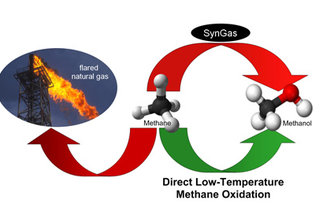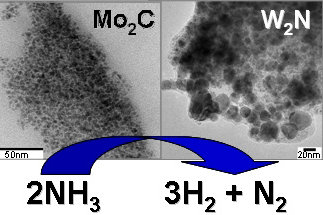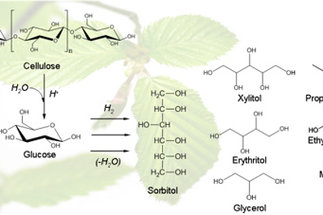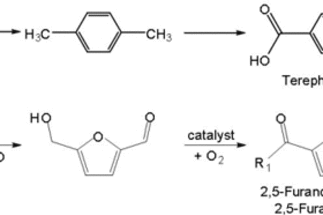Heterogeneos Catalysis and Sustainable Processes
Regina Palkovits joined RWTH Aachen as Professor of Heterogeneous Catalysis and Technical Chemistry in 2010. Information on her current research is available here. This web page documents the activities of her group at the Max-Planck-Institut für Kohlenforschung (until 2010).
Our research focuses on the development of novel solid catalysts for the efficient utilization of fossil and renewable resources and process design for the transformation of biomass into value-added chemicals and biofuels.
Research Topics:
Direct oxidation of methane to methanol is a long standing challenge in catalysis hampered by the high binding energy of the CH3-H bond and the ease of overoxidation to CO2. Our studies concentrate on the development ...
[more]
Ammonia synthesis is one of the most important achievements of the chemical industry. Recently however, ammonia decomposition has attracted increasing attention, not only for cleanup of syngas from coal or biomass gasification but increasingly also for the on-site production of COx-free hydrogen for fuel cell applications. Accordingly, suitable catalysts for both ...
[more]
Our research with special focus on for development of processes for efficient utilization of renewable resources in developing and emerging countries is funded by the Robert Bosch Foundation in the frame of the Robert Bosch Junior Professorship for Sustainable Use of Renewable Natural Resources.
[more]
Hydrogenolysis of cellulose and hemicellulose resulting in C-C and C-O cleavage is a promising technology for the direct transformation of biomass into value-added chemicals and could be an entry point for future biorefinery concepts. Suitable catalyst systems cover the whole range of molecular and solid acid catalysts together with hydrogenation catalysts. Interestingly, the requirements concerning...
[more]
Terephthalic acid presents such an important oil-based building block for chemical synthesis and important monomer for a multitude of polymers such as polyethylene terephthalate (PET) or polyamide. Accordingly, a biomass-based
[more]
Links:
RWTH Aachen - Excellenzcluster „Massgeschneiderte Kraftstoffe aus Biomasse“
Forschungsverbund „ENERCHEM“
Utrecht University - Department of Inorganic Chemistry
Technische Universität Dortmund - Fakultät Bio- und Chemieingenieurwesen
American Chemical Society
Deutsche Forschungsgemeinschaft
Fonds der chemischen Industrie
Gesellschaft Deutscher Chemiker
Nordrhein-Westfälische Akademie der Wissenschaften
IUPAC



